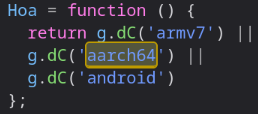970
Hector Martin (@marcan@treehouse.systems)
social.treehouse.systemsAttached: 2 images
Today I learned that YouTube is deliberately crippling Firefox on Asahi Linux. It will give you lowered video resolutions. If you just replace "aarch64" with "x86_64" in the UA, suddenly you get 4K and everything.
They literally have a test for "is ARM", and if so, they consider your system has garbage performance and cripple the available formats/codecs. I checked the code.
Logic: Quality 1080 by default. If your machine has 2 or fewer cores, quality 480. If anything ARM, quality 240. Yes, Google thinks all ARM machines are 5 times worse than Intel machines, even if you have 20 cores or something.
Why does this not affect Chromium? **Because chromium on aarch64 pretends to be x86_64**
`Mozilla/5.0 (X11; Linux x86_64) AppleWebKit/537.36 (KHTML, like Gecko) Chrome/120.0.0.0 Safari/537.36`
🤦♂️🤦♂️🤦♂️🤦♂️🤦♂️
Welp, guess I'm shipping a user agent override for Firefox on Fedora to pretend to be x86.
**EDIT**: The plot thickens. Pretending to be ChromeOS aarch64 *still gets 4K*. Specifically: `Mozilla/5.0 (X11; CrOS aarch64 10452.96.0) AppleWebKit/537.36 (KHTML, like Gecko) Chrome/66.0.3359.181 Safari/537.36` still works.



Well… That seems uselessly risky and complex when you can just ask them to not do that. The issue tracker said the Youtube folks have been informed. Let’s just see if they fix that rather quickly. (but they are certainly not the only one with that kind of stuff. I’m not a big fan UA discrimination. I mean, this kind of stuff is what webcompat is all about.) (except for some purpose where you truly care about the architecture, like selecting a download link for an installer) (on the other side, I’m totally fine with feature-flags based discrimination, but that need to be done client-side).